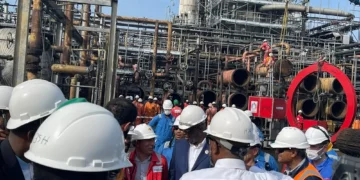The Nigeria Liquified Natural Gas (NLNG) has signed a Memoranda of Understanding (MOU) with three Nigerian teaching hospitals to flag off the second phase of its multibillion-naira Hospital Support Programme (NLNG HSP)
The NLNG Hospital Support Programme (HSP) is NLNG’s national Corporate Social Responsibility (CSR) initiative which aims to boost the healthcare delivery system in 12 Federal University Teaching Hospitals cutting across all six geopolitical zones in the country.
The programme started in 2022 with the signing and implementation of MoUs with the six hospitals in the first phase of the programme.
For the second phase, NLNG’s deputy managing director, Mr. Olalekan Ogunleye, representing the managing director, Dr. Philip Mshelbila, signed MoUs with respective medical directors of the University of Port Harcourt Teaching Hospital (UPTH), Port Harcourt, for the equipping of Haemodialysis Centre; the University of Uyo Teaching Hospital (UUTH), Uyo for the renovation and equipping of an accident and emergency unit and theatre; and Jos University Teaching Hospital (JUTH), Jos for the construction and equipping of a twin theatre suite.
According to Ogunleye, the company’s vision of being a globally competitive LNG company, helping to build a better Nigeria, has inspired the firm’s CSR intervention in the over 20 years of its operation.
He stated that, Nigeria LNG would implement a third phase of the programme whilst hospital projects in earlier phases are being completed and commissioned.
He also stated that the company recognised that good healthcare was necessary for economic, human, and social development in Nigeria, adding that, NLNG has placed a premium on healthcare due to this recognition.
“Nigeria faces several health challenges, including infectious diseases, maternal and child mortality, and non-communicable diseases. Poor health outcomes can severely affect economic growth, human development, and overall well-being. Access to quality healthcare can improve productivity, reduce mortality rates, improve educational outcomes and the quality of life, and increase life expectancy and social and economic status.
“Poor health outcomes disproportionately affect vulnerable populations, including women, children, and the elderly. Access to quality healthcare can also help reduce health disparities and promote social equity. This, in turn, can help reduce poverty, promote gender equality, and promote social cohesion.
“Already, we have recorded successes in phase one commissioned projects at University of Benin Teaching Hospital (UBTH) and University of Abuja Teaching Hospital (UATH), Gwagwalada. The commissioned maternity complex in UATH opened to the delivery of health care services and enrolment of antenatal patients in January 2023, when the first baby was born. Four (4) maternal deliveries and three (3) Caesarean sections have been recorded so far. Two (2) babies have also been successfully nursed at the Special Care Baby Unit (SCBU),” he said.
The teaching hospitals in Phase 1 include Lagos University Teaching Hospital (LUTH), Lagos; University of Abuja Teaching Hospital (UATH), Gwagwalada; Aminu Kano Teaching Hospital (AKTH) Kano; University of Benin Teaching Hospital (UBTH), Benin; University of Calabar Teaching Hospital (UCTH), Calabar; and Niger Delta University Teaching Hospital (NDUTH), Yenagoa.
Other projects in the first phase due for commissioning in 2023 include; an Occupational Therapy and Neuromodulation Rehabilitation Centre at the Aminu Kano Teaching Hospital (AKTH), an Obstetrics & Gynaecology Ward at the Lagos University Teaching Hospital (LUTH), and a Neurosurgical & Stroke Centre at the University of Calabar Teaching Hospital (UCTH).In his goodwill message, the minister of Health, Dr. Osagie Ehanire, who was represented by the permanent secretary, Federal Ministry of Health, Alhaji Mahmuda Mamman, stated that, health care service delivery was a collective responsibility in which all stakeholders are expected to contribute their quota in order to make it accessible and affordable.
He commended NLNG for its resilience, dedication and continued support to the heath sector and the achievement of universal health coverage, while calling on other organisations to partner with government as part of their corporate social responsibility initiatives to fill the gaps in the sector.





